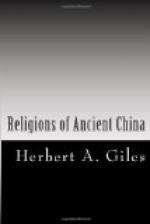God is on your side!
was the cry which stimulated King Wu to break down the opposing ranks of Shang. To King Wu’s father, and others, direct communications had previously been made from heaven, with a view to the regeneration of the empire:—
The dynasties of Hsia
and Shang
Had not satisfied God
with their government;
So throughout the various
States
He sought and considered
For a State on which
He might confer the rule.
God said to King Wen,
I am pleased with your
conspicuous virtue,
Without noise and without
display,
Without heat and without
change,
Without consciousness
of effort,
Following the pattern
of God.
God said to King Wen,
Take measures against
hostile States,
Along with your brethren,
Get ready your grappling-irons,
And your engines of
assault,
To attack the walls
of Ts’ung.
God sends Famine.—The Ode from which the following extract is taken carries us back to the ninth century B.C., at the time of a prolonged and disastrous drought:—
Glorious was the Milky
Way,
Revolving brightly in
the sky,
When the king said,
Alas!
What crime have my people
committed now,
That God sends down
death and disorder,
And famine comes upon
us again?
There is no spirit to
whom I have not sacrificed;
There is no victim that
I have grudged;
Our sacrificial symbols
are all used up;—
How is it that I am
not heard?
The Confucian Criterion.—The keystone of the Confucian philosophy, that man is born good, will be found in the following lines:—
How mighty is God!
How clothed in majesty
is God,
And how unsearchable
are His judgments!
God gives birth to the
people,
But their natures are
not constant;
All have the same beginning,
But few have the same
end.
God, however, is not held responsible for the sufferings of mankind. King Wen, in an address to the last tyrant of the House of Shang, says plainly,
It is not God who has
caused this evil time,
But it is you who have
strayed from the old paths.
The Associate of God.—Worshipped on certain occasions as the Associate of God, and often summoned to aid in hours of distress or danger, was a personage known as Hou Chi, said to have been the original ancestor of the House of Chou. His story, sufficiently told in the Odes, is curious for several reasons, and especially for an instance in Chinese literature, which, in the absence of any known husband, comes near suggesting the much-vexed question of parthenogenesis:—




